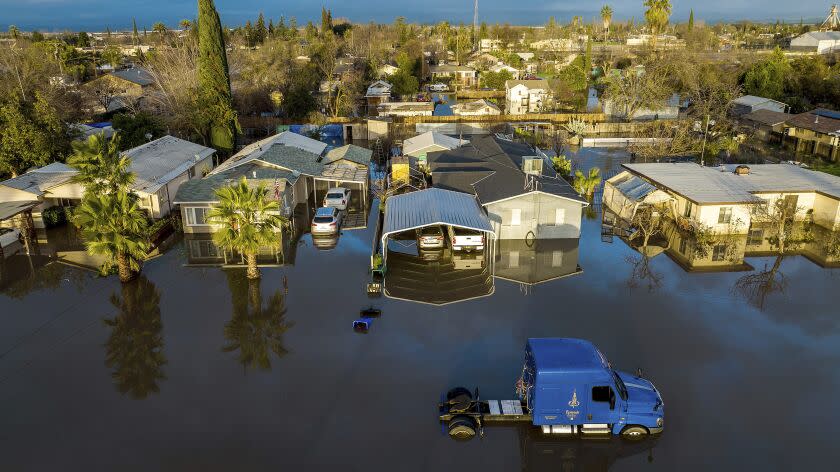Did your apartment flood? Renters insurance is unlikely to help you

Communities across California were forced to evacuate their homes following torrential rainfall, road closures and flooding. Now renters are wondering what to do if their personal items are submerged and damaged.
You may have to show some patience. If an evacuation order by the local sheriff's or fire department is in place, do not return until the order has been lifted.
Many people will not be able to return to their homes yet — multiple areas still coping with floods, mudslides and sinkholes, including parts of L.A. County, can expect more rain in the coming days.
Once you’re able to safely return to your rental and assess the damage, there are two things you should know.
First, damage to the rental property is not your responsibility, it's the landlord's. Second, although a renters insurance policy can help under certain circumstances, it will not cover flood damage to your personal property.
Renters insurance reimburses you for damage to your belongings, including losses caused by some — but not all — natural disasters. The natural disasters that are not covered by rental insurance include floods, mudflows and sinkholes (and earthquakes, another threat in this state).
Janet Ruiz, communications director for the Insurance Information Institute, said flood damage is defined as losses caused by water that rises from the ground up. However, if water comes into your home from above — for example, when wind damages the roof or a window and rain cascades in — there is a possibility of coverage.
A water pipe that bursts and floods your dwelling is the other type of water damage that is covered by a renter's policy, Ruiz said.
If your furniture, clothes, and computer are floating in a pool of floodwater in your living room, chances are good that you'll have to pay out of pocket to replace it.
Your renters policy may still come in handy if you're forced to move by the storms. Depending on the extent of the damage, a dwelling can be deemed uninhabitable. Your insurance might be able to cover the costs associated with temporary relocation; contact your insurance provider to find out.
Ruiz said most policies will pay for your additional living expenses when you are displaced from your home by a covered loss (such as damage caused by the wind) and need temporary shelter. Keep all your receipts to document your expenditures.
What else can you do?
Renters do have the option of applying for FEMA's National Flood Insurance program. This flood insurance is a separate policy that covers a building, its contents, or both.
For renters, the program covers up to $100,000 in damage to the contents of a unit.
The National Flood Insurance Program is available to anyone living in one of the 24,000 participating communities or in a flood-prone area. You can see whether your community is part of the program by checking the "community status report" on the program website.
If your community is in the program, you can obtain a flood policy from a participating insurer. The National Flood Insurance program offers a list on its website.
The policy won't go into effect, however, until 30 days after it's purchased.
You can also reach out to private insurers to see if they offer their own version of flood insurance. But there aren't many that do, Ruiz said, so your best bet is to stick with the National Flood Insurance Program.
You might not be able to get reimbursed for your lost items at the moment, but you can deduct the amount you lost on your state and federal tax returns.
Taxpayers in a federally declared disaster area who suffer uninsured or unreimbursed disaster-related losses can claim them on the year of the loss or the previous year when filing taxes. That means residents of Los Angeles County and 30 other counties around the state could write off their current storm-related losses on their income tax returns for either 2022 or 2023.
When filing your taxes, write the FEMA declaration number EM-3591-CA on any return claiming a loss.
What if my car has been damaged?
Flood damage to cars, including flooding from a storm surge, is covered if you have "comprehensive coverage," also known as "other than collision" coverage, as part of your auto insurance. Comprehensive coverage is optional with a standard auto policy.
Ruiz said most people who took out a car loan to buy their vehicle will have comprehensive coverage because loan companies require it.
Some people with older cars do not elect to have the coverage, however. That's because, "at the end of the day, you only get the value of the vehicle," she said.
This story originally appeared in Los Angeles Times.
